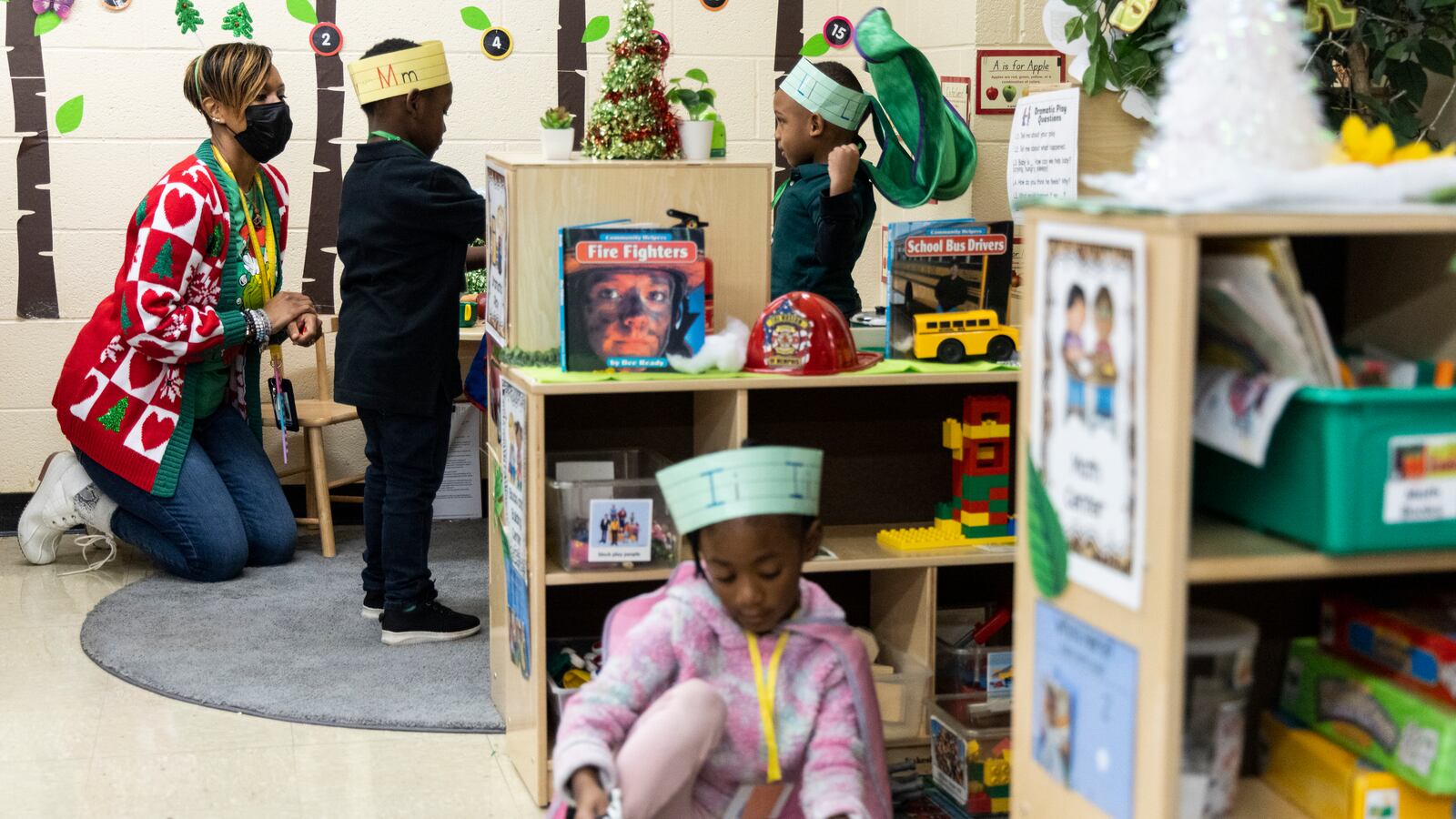When Jairia Cathey switched from teaching elementary school to pre-kindergarten more than a decade ago, it was a tough adjustment. Some students didn’t know how to hold a pencil or a fork, she recalled. Some didn’t know their parents’ names, or even their own. And some didn’t know how to color.
“I was like ‘what did I get myself into?’” Cathey said. “I thought every child knew how to color.”
But those challenges didn’t come close to what she would experience trying to educate and engage with 3-, 4- and 5-year-olds during the depths of COVID-19 pandemic — or what it would take to try to get them caught up in the aftermath.
When schools closed abruptly in 2020, derailing education for students across Memphis and the country, Cathey, a teacher at Evans Elementary, scrambled to provide virtual learning any way she could think of. She sent parents pictures of worksheets and activities from her classroom. She searched Pinterest for other learning materials. At a certain point, she set up times to visit each of her students at their home, with a face mask on.
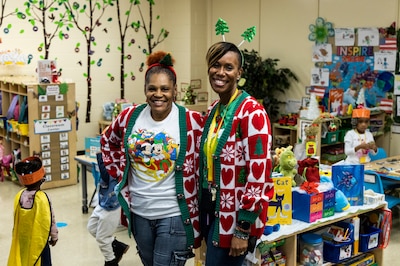
“I just had to lay eyes on them, and I know they had to lay eyes on me,” Cathey said. “Even if it was just giving them a pencil or a coloring book or just a hug, I had to do it.”
Plummeting enrollment in MSCS early childhood programs during the pandemic left just a handful of students in her class. When classrooms reopened in the spring, the families of Cathey’s four students decided to keep them learning remotely. And by the time students returned to her classroom after 18 months of distance learning, the few students who came arrived with a severely disrupted preschool experience or having attended no school at all, at risk of falling behind academically, socially, and emotionally.
Now Cathey and co-teacher Lisa Patterson are part of a mobilization across Memphis-Shelby County Schools to get early childhood learning in the district back on track. The effort is focused on the classroom, but it’s also counting on community groups, advertising, family engagement specialists, and multiple offices within district headquarters, with the goal of getting more students enrolled in early childhood programs and making sure they are kindergarten-ready.
The bigger objective: Containing the pandemic’s long-term impact on children and their education in Tennessee’s largest school district, where most students are Black and come from low-income families who were hit hardest by COVID-19.
The task is daunting. After bottoming out at 4,430 in 2020-21, enrollment in MSCS’ pre-K programs has ticked back up to 4,776 this year. But it’s still far below pre-pandemic levels of above 6,000.
Meanwhile, just 32% of students starting kindergarten last school year were considered ready overall, as measured by early reading and math assessments. That’s down from 40% in 2020-21, and 46% before the pandemic.
A 2020 study published by the American Academy of Pediatrics found that children who are not adequately prepared for kindergarten are more likely to struggle for the rest of their academic career — in later elementary school, high school, and beyond.
“I’ve seen the results of when we get it wrong,” said Divalyn Gordon, a former kindergarten and first grade teacher who has also worked at alternative high schools and now heads MSCS’ early childhood office.
“Those students later drop out of school … they’re making tally marks and counting on their fingers because they don’t know any multiplication facts. They can’t read to learn or comprehend. Those foundational skills are vital for student success as they matriculate through high school,” Gordon said. “That’s why I push so hard for pre-K. We’ve got to get this right.”
Gains from pre-K program follow students into higher grades
District officials have made early childhood education a centerpiece of their strategy to improve the district’s academic performance and recover from the pandemic. Test score data helps explain the emphasis.
The April data shows that even amid steep declines in kindergarten readiness across the district, students who attended MSCS pre-K scored significantly higher in reading, math, and overall readiness compared with those who did not attend.
The same was true for students who are considered economically disadvantaged. And their higher performance followed them into third grade. Students from low-income families who attended a district pre-K program were slightly more likely to be proficient in English and language arts in third grade than those who did not participate in the program, according to the report.
The third-grade performance is critical, because a new state law that takes effect this year requires schools to hold back third-graders who aren’t considered proficient in reading. The law has added pressure on districts to intervene early.
MSCS prioritizes students who come from economically disadvantaged households for pre-K enrollment. But interest in the program dropped off dramatically after COVID hit and instruction went online. And persistent concerns about COVID led many parents to decide it was safer to keep their child at home than to send them to an optional program.
Because of that, Cathey said she is getting her students later, and they’re far behind — academically and otherwise. She has had to adjust her instruction accordingly.
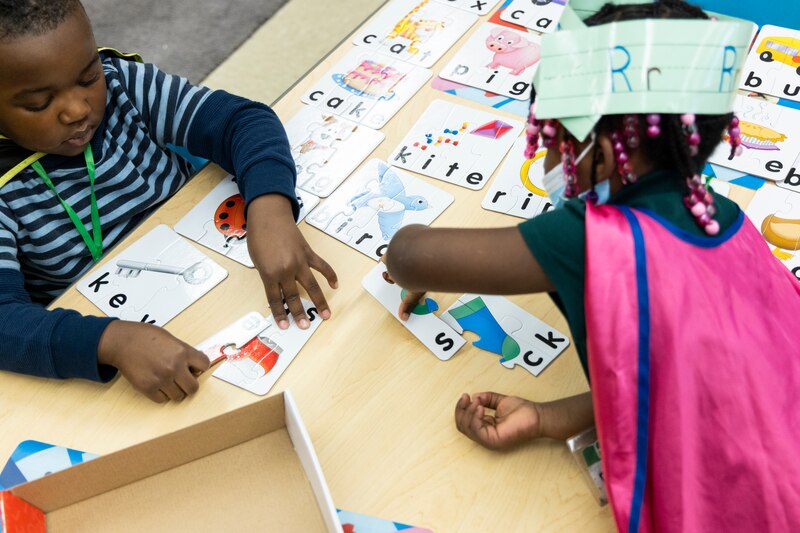
Small group instruction has always been a critical piece of early childhood education, but given the delayed progress for some students, it’s more important than ever, Gordon said.
Gordon pointed to Cathey’s classroom as an example: Cathey’s 19 students were divided into four groups based on their skill levels, but named for different colors. On that December morning, Cathey and her co-teacher Patterson circulated through the room, giving individualized attention and instruction to students in each group, depending on what they were working on and what they needed.
At one point, Cathey sat cross-legged on the floor next to one girl, and they talked about a book she was paging through. In another corner of the room, Patterson helped two students completing a spelling puzzle.
“You have to make those real-life adjustments when students don’t get it or don’t have the necessary foundation,” Gordon said.
And if teachers don’t, she said, “those kids fall through the cracks.”
District enlists community partners to boost enrollment
With pre-K enrollment across MSCS recovering slowly, Gordon said, the district is laser-focused on attracting more students to the program.
The district continues to work with the Salvation Army Purdue Residential Facility, a Memphis homeless shelter for women, and the Shelby County Division of Corrections to identify and enroll pre-K-age students who could particularly benefit from early academic intervention, Gordon said.
MSCS has also beefed up its advertising efforts, from billboards to social media ads, Gordon said. “The journey begins with pre-K,” the ads on Facebook and elsewhere in the community usually say. “Get your future scholar started early on their academic journey.”
Meanwhile, it has expanded its family engagement team to a staff of over 100 specialists who are charged with encouraging families who begin the online application process to finish it.
Family engagement specialists also help parents find another location if the school they requested is no longer available. Sometimes that means connecting families with other early childhood education providers in the community, Gordon said.
To ensure quality — the bigger challenge in Memphis, which does not have an acute shortage of child care services — the district requires those providers to follow the same bid process it uses for other services, and beginning this year, administrators visit the campus in person to confirm that best practices are being used in classrooms.
It’s part of a broader district effort, outlined in February by then-Superintendent Joris Ray, to increase community-wide collaboration in early childhood education.
The district has two representatives — Gordon and Angela Whitelaw, the district’s deputy superintendent of schools and academic support — in a community consortium dedicated to improving early literacy. The consortium includes prominent early childhood organizations and child care providers from across Memphis, including the Urban Child Institute, Porter-Leath, Literacy Mid-South, First 8, Next Memphis, and the Hyde Family Foundation, among others.
Since early childhood became a top priority for the entire district, collaboration with other departments across the massive district has also improved, said Detris Crane, director of MSCS Head Start programming.
“The district has realized that these pre-K families are the same ones who come in for K-12, and that the earlier we intervene, the more we can improve outcomes for both children and their families,” Crane said. “I collaborate with everybody in the district now, in every department.
“I used to be on a little island,” Crane said. “Now we’re on the mainland.”
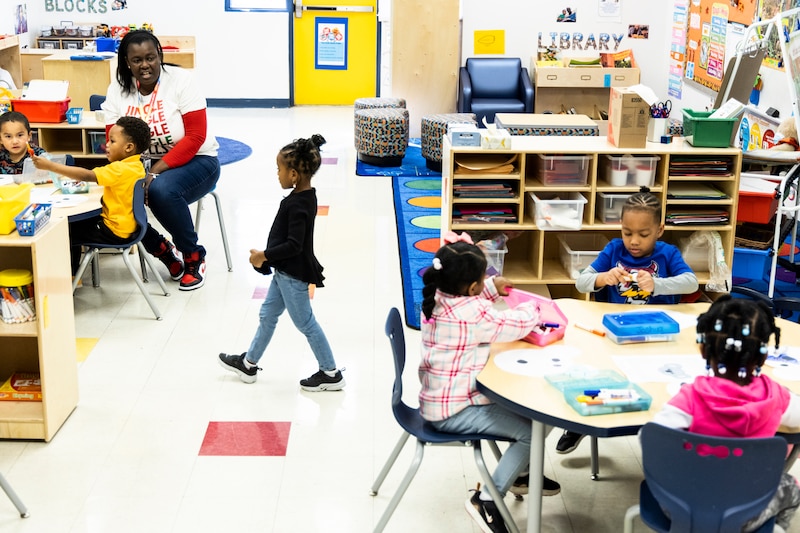
COVID left emotional scars
Beyond the academic fallout, trauma related to COVID and poverty continues to loom large among MSCS students and families, several MSCS teachers said.
Ida Walker, a pre-K teacher at Douglass Head Start in northeast Memphis, said the social and emotional tolls of the pandemic have been the most noticeable among her students.
Many of them “have something going on at home,” said Walker, who’s been a Head Start teacher since 2018. Some lost family members or caregivers in the pandemic. Others’ families have yet to recover from the deep economic consequences of COVID.
Pre-literacy skills remain a large focus in Walker’s classroom. As she read aloud to one small group of students, her co-teacher Tequila Lockett helped two other groups of students draw koala bears as part of the class’ two focuses that week, the letter K and “awesome animals.”
But so are students’ social and emotional needs. Walker has rearranged her classroom to create a “cozy corner” where her students can take time away from whatever they’re doing to regulate their emotions and seek support from Walker or her co-teacher throughout the day.
Walker hopes her students learn how to express and process their feelings. If their social and emotional needs are met now, the rest will come later, Walker said.
“They pick it up fast,” she said with a smile.
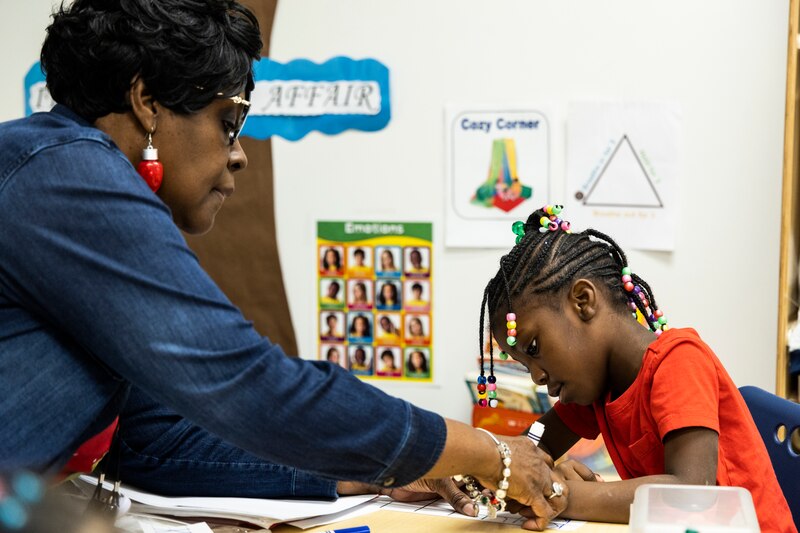
Cathey takes a similar approach in her classroom — what she hopes is a “safe haven” from whatever children are dealing with at home. Beyond teaching them early literacy and math skills, she strives to build relationships with students and their families and ensure their social and emotional needs are met.
Cathey and Patterson also try to model caring for one another to their students, so that even if one of them isn’t nearby when a child is struggling, their classmates know to step in. Now, if a student falls or looks sad, Cathey said, their peers are quick to ask, “Are you OK? Can I help you?”
“It is a joy seeing students come in at the beginning of the year, complete blank slates. We introduce literacy. We promote language, math skills, teach them how to take care of themselves, and take care of others,” Cathey said. “When they leave, they’re writing sentences, they’re making words, they’re adding and subtracting, They learn how to work out their feelings, and it’s just so amazing to see them so independent.”
“It’s just so rewarding,” Cathey added. “We’re getting them ready for the rest of their lives.”
This story is the third and final installment of a Chalkbeat Tennessee deep dive into the role early childhood education can play in improving literacy in Memphis and across the Volunteer State. This effort is supported by the Education Writers Association Reporting Fellowship program. Check out the first and second stories of the series.
Samantha West is a reporter for Chalkbeat Tennessee, where she covers K-12 education in Memphis. Connect with Samantha at swest@chalkbeat.org.

